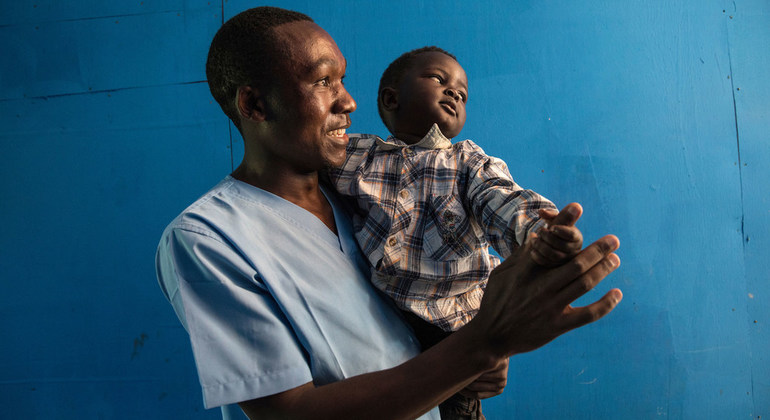The outbreak began in August 2018 and is the largest and longest running that the DRC has experienced, with more than 3,000 cases and 2,137 deaths.
The latest figures released by WHO on Friday for the week ending 1 October, showed 20 new confirmed cases reported in North Kivu and Ituri provinces, versus 29 in the previous week. The agency said this decrease “should be interpreted with caution, as operational and security challenges in certain health zones make it difficult to undertake case detection and response functions.”
WHO said there had been a “clear shift in the hot spots of the outbreak from high density, urban settings, such as Butembo, Katwa, and Beni, to more rural areas with a lower population density.”
However, new tools are helping to stop the deadly virus and save lives. Among them is a highly effective vaccine, which has a 97.5 per cent effective rate. So far, more than 225,000 people have been protected.
“I never thought I would make it at first but now that I am cured, I want to go back to my community and tell them to seek treatment early if they are affected because you can actually survive,” said Kavira, who beat the disease.
UN Secretary-General António Guterres presented her with an Ebola survivor certificate when he visited the country earlier this month.
Survivors crucial to ending Ebola
David Gressly, Emergency Ebola Response Coordinator, said although every survivor serves as motivation to continue the fight against the disease, they also are a reminder of those who could not be saved.
“We have to continue gaining access through improved security for health workers and populations alike, along with continuous efforts to engage communities to be empowered with the response,” he stated.
“We cannot win the battle against this outbreak without the full support of the Congolese people.”
The Ebola epidemic began in North Kivu province in the east of the country. It has since spread to parts of neighbouring Ituri and South Kivu provinces, but active transmission currently is confined to several hotspots in Ituri.
The epidemic is taking place against a backdrop of ongoing conflict involving numerous armed groups, but other factors further complicate the situation such as poor health services, political instability, and community mistrust and resistance.
Several UN agencies are working to stop the outbreak, such as the World Health Organization (WHO) and the World Food Programme (WFP), alongside international partners like Save The Children.
The United Nations scaled-up its efforts in May in support of the Government-led response in the areas of public health, assistance to Ebola-affected communities, political engagement, security and also in strengthened financial management.
Led by the UN Children’s Fund, UNICEF, thousands of Congolese responders and associations from affected areas are engaging with community and religious leaders, the media and others to bring information to those communities most at risk, including children.
Survivors have become “a crucial element” in gaining community trust and acceptance, according to Edouard Beigbeder, UNICEF representative in the DRC.
“When survivors tell communities the reason they are alive is because they sought treatment early, people believe them and are getting the help they need sooner. At the same time, having experienced the disease, they are able to offer a level of support and compassion to patients and their family members that is especially meaningful,” he said.
Supporting survivors and potential carriers
Dr Ibrahima Socé Fall, WHO Assistant Director-General for Emergencies Response, stressed that while tools, vaccines and treatments for Ebola are available, it is still critical to find and support everyone who has been in contact with an infected person.
“Surviving this disease is all about trusting the responders – contact tracers, decontamination teams, burial teams, vaccinators, Ebola Treatment Centre staff – who are working tirelessly to protect people from this virus,” he said.
Ebola survivors and those potentially carrying the virus also receive support from the World Food Programme (WFP), the UN agency fighting hunger globally. WFP provides these people with food, meaning they will not have to leave their homes to shop, and can thus be easily monitored in the event they develop symptoms.
Susana Rico, the agency’s emergency coordinator in the North Kivu capital, Goma, said survivors are grateful for the food assistance, which lasts for one year.
“It is surely a celebration when cured patients go home after surviving Ebola; they feel reborn,” she said, adding “This celebration must also serve as our motivation to continue the fight against Ebola and save many more by encouraging communities to alert about potential cases, so that they can seek treatment in time to be saved.”


